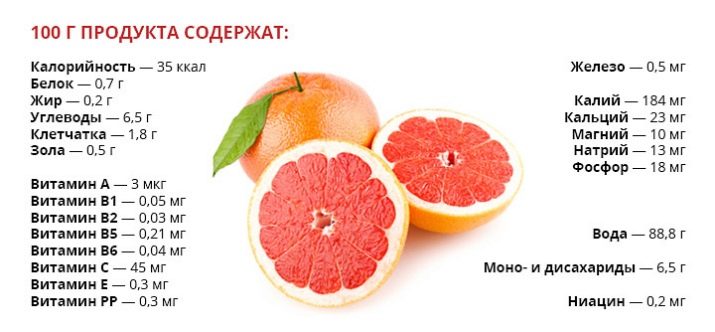Grapefruit with diabetes mellitus: what properties has and how to use?

The inclusion of fruit in the diet of a person suffering from frequent "jumps" of glucose in the blood can be a very difficult task.This article will help you to understand what properties grapefruit has and how to properly use this fruit in diabetes.
Benefit
Grapefruits have been known for many centuries. The second name of this plant is “grape tree”. This name the plant was not accidental. The fact is that fruits produced on grapefruit trees grow in clusters. So, on one such “bunch” can grow from 4 to 14–16 fruits (depending on the variety). Grapefruit trees grow mainly in countries with hot climates. So, there are planting of such trees in India, USA, in Jamaica.
The history of the origin of this plant to this day remains a mystery. Not all scientists have come to a common opinion about which state can be considered the birthplace of this wonderful plant. According to one of the most popular theories, the fruits of the grapefruit tree are the result of the occasional “mixing” of pomelo and sweet orange.
The taste of grapefruit depends largely on its variety. Most people believe that the fruits of a grapefruit tree have a rather tart and sometimes even bitter taste. However, there are varieties of grapefruits that have a sweet taste. Such fruits are commonly used to make desserts and fragrant juices. Currently, breeders have bred more than 20 varieties of this plant.
Interestingly, the plant takes several months to ripen the fruit. Usually the fruits ripen in 9-9.5 months. Immature fruits have a thicker skin and a bitter taste. Also, they may contain specific acidity. The grapefruits ripened on the hot sun have a sweeter taste, as well as a unique unique flavor. Such fruits are ideal for preparing various salads, as well as for making sauces.
Grapefruit is rich in various active substances. So, in the fragrant, slightly tart pulp of this fruit contains a lot of ascorbic acid. This substance helps to strengthen the walls of blood vessels through which blood flows to all organs of our body. Scientists have shown that people who regularly eat grapefruit are less likely to develop hypercholesterolemia (increase in blood cholesterol).
Contained in fragrant fruit and components that contribute to lowering blood pressure. However, in order to notice this result, use grapefruit or juice made from these fruits should be systematically.
Diabetes mellitus is a pathology, dangerous development of many complications. Thus, frequent rises in blood sugar levels can lead to the development of retinopathy, a vascular pathology of the retina. Unfortunately, this complication of diabetes mellitus is recorded quite often. The use of grapefruit helps reduce the development of this pathology.
Vascular complications that can develop with protracted diabetes mellitus, significantly complicate the treatment of this disease. To eliminate such violations, a person is forced to take a huge amount of various medications. Doctors note that timely prevention of the development of such disorders helps to reduce the risk of their development at times.
The inclusion of grapefruit in the diet of diabetics reduces the probability of the formation of vascular complications of diabetes several times.
Persons suffering from persistent hyperglycemia, it is very important to monitor the use of vitamins of group B. Grapefruit contains a whole complex of such substances. The use of such fruits helps to reduce the risk of polyneuropathy, a pathology that often develops when there is insufficient intake of B vitamins in the body and is recorded in people with diabetes.
Potential harm
Eating grapefruit does not follow people who have an allergy to them. Individual intolerance of these fruits is another contraindication to their reception.
Grapefruits are quite poorly combined with drugs. So, if a person suffering from diabetes has any combined pathologies of internal organs, due to which he has to constantly take medicine, then he should always consult a doctor before including grapefruit in his diet.
Grapefruit juice is rich in substances that have an acidic effect on the body. That is why this drink is not suitable for people who have gastritis with a high secretion of gastric juice or suffering from peptic ulcer. Acceptance of such fruit juice can lead to severe pain in the projection of the stomach.
Be careful when using grapefruit juice is also necessary for all those who have a high sensitivity of tooth enamel. So, the use of such a drink can provoke the occurrence of severe pain in the teeth and gums. In order to reduce the risk of developing these symptoms, you should rinse your mouth well with water after taking the flavored drink.
Can diabetics be eaten?
Grapefruits are “fruit of the exception,” which can be consumed in type 2 diabetes. However, there are such fragrant fruits can only be people who do not have contraindications to their reception. In order not to harm your body, people suffering from persistent hyperglycemia should always consult an endocrinologist before including these tart fruits in their diets.
When making a menu for diabetics, doctors recommend monitoring the glycemic index of products. Scientists have established this indicator relatively recently. It shows how quickly the carbohydrates entering the human systemic circulation can lead to the development of increased sugar levels. All products are conventionally divided into several categories with different glycemic indices.
Most fruits have a relatively high figure. That is why they are not included in the diet of a person suffering from type 2 diabetes. However, there are exceptions. So, the glycemic index of the fruits of the grapefruit tree is only 29 U. A product having such an indicator can certainly be included in the diet of a person suffering from frequent "jumps" in blood sugar.
Interestingly, grapefruit contains a whole range of active components that can have a strong impact on the course of metabolic processes. So, for example, in the bitter pulp of the fruit pantothenic acid is contained - a substance capable of normalizing the indicators of fat, protein and carbohydrate metabolism. That is why grapefruits are allowed for use by obese people.
Diabetes and obesity, unfortunately, are often combined pathologies. Hormonal disorders occurring in a person with diabetes, contribute to the rapid weight gain. The lack of full physical exertion and improperly chosen diet only aggravate the situation.
Normalizing weight without the threat of hyperglycemia diabetic can be achieved by adding grapefruits to your menu.
Drinking 2–3 slices of this fragrant fruit per day will help improve metabolic rates. In this case, worry about the development of "jump" of sugar in the blood is not worth it.
How best to eat?
People with diabetes often face the question of how best to eat grapefruit. Doctors believe that it is better to include its pulp in the diet. It contains many useful substances that are necessary for the body. Chopped fruit slices can be added to various salads, which can be an excellent side dish for meat or fish dishes.
For people who are obese or overweight, it is better to eat the fruit itself, and not to drink grapefruit juice. The fact is that in a glass of grapefruit fresh juice will contain more sugar and less fiber than in the lobules of the fruit.
If the body weight of a person suffering from diabetes remains within the normal range, then he can afford to drink a glass of grapefruit juice, without fear for the development of any adverse symptoms. However, it should be remembered that such a drink should be consumed only in diluted form. Grapefruit juice is best diluted with simple boiled water in a ratio of 1: 1 or even 1: 2.
When eating grapefruit, be sure to remember the quantity. So, 3-4 slices per day is enough to enrich your body with useful substances. Exceeding the recommended dosage can be dangerous in the development of adverse symptoms, as well as the exacerbation of existing chronic diseases of the gastrointestinal tract.
You will learn more about the benefits and harms of grapefruit in the following video.






























